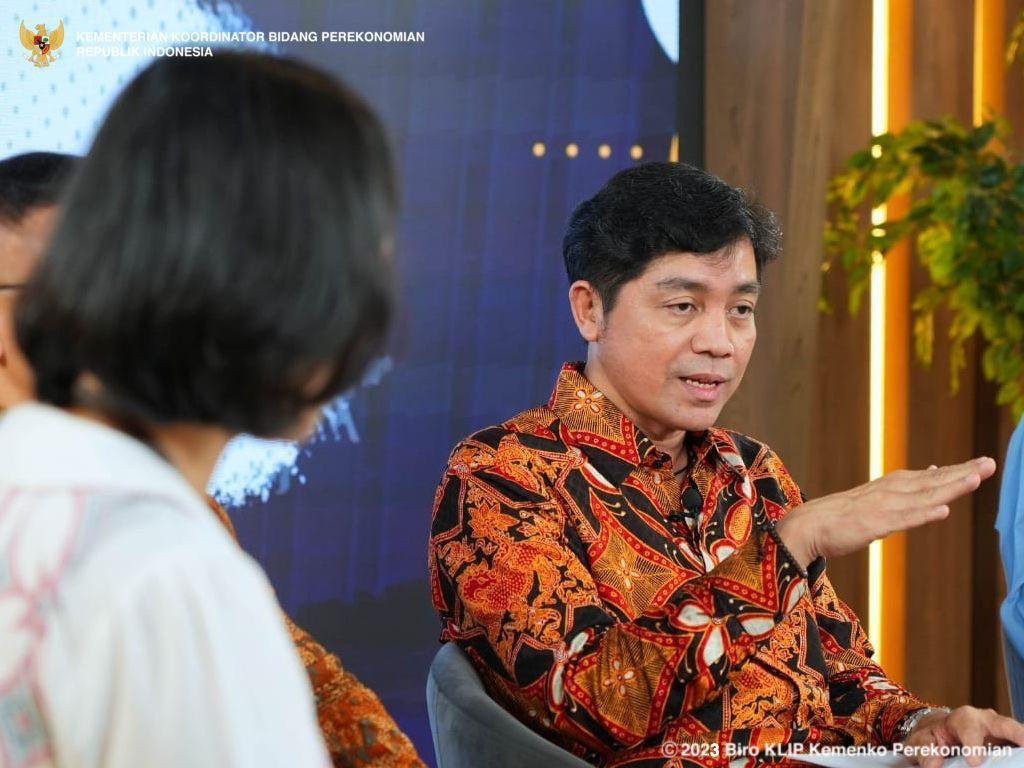Popular Reads
Top Results
Can't find what you're looking for?
View all search resultsPopular Reads
Top Results
Can't find what you're looking for?
View all search resultsGovt maintains high, inclusive and superior economic growth
Change text size
Gift Premium Articles
to Anyone
I
ndonesia is focusing on strengthening high, inclusive and superior economic growth as the country booked economic growth of 5.17 percent year-on-year (YoY) in the second quarter (Q2) of 2023.
In July 2023, Indonesia was again included in the upper-middle income country classification with a gross national income (GNI) per capita of US$4,580. In the same month, the R&I rating agency also raised Indonesia's outlook from stable to positive, and maintained Indonesia's sovereign credit rating at the BBB+ level.
Coordinating Economic Minister Airlangga Hartarto said that in July, Indonesia had been categorized as an upper-middle income country, occupying the same status as ASEAN member countries such as Thailand and Malaysia. By the end of 2024, Indonesia's per capita income is targeted to reach $5,500.
The synergy of stakeholders, including regional governments, allowed the achievement of economic growth accompanied by controlled inflation of 3.08 percent YoY in July 2023, while the trade balance continued the surplus trend for 39 consecutive months. From January to July 2023, the trade surplus reached $21.24 billion.
In the midst of contracting net exports, household consumption and investment (PMTB) made a large contribution to economic growth.
From Indonesia’s social indicators, the extreme poverty rate also continued to decline to 1.12 percent as of March 2023, while the unemployment rate also fell to 5.45 percent in February 2023 and the Gini ratio dropped to 0.39 in March 2023.
The performance of the state budget (APBN) until July 2023 was positive with realized state revenue of 65.6 percent of the target and expenditure at 47.7 percent of the ceiling, so that the APBN surplus has reached 0.72 percent of the gross domestic product (GDP).
Wholesale automotive sales from January to July 2023 rose 4.5 percent compared with the same period last year, while sales of electric vehicle (EV) cars rose 900 percent in the first half of 2023 compared with the same period last year.
"This is an asset in the second half for us to continue pursuing our economic growth target," said Ferry Irawan, acting deputy for macroeconomic coordination and finance at the Office of the Coordinating Minister for Economic Affairs.
Ferry noted that Indonesia’s economic prospects until the end of the year are still very strong, which can be seen from several indicators in July 2023, namely the Consumer Confidence Index, which continues to be at an optimistic level of 123.5, the Real Sales Index growing by 6.3 percent, and Indonesia's manufacturing purchasing managers index (PMI) at an expansive level of 53.3. External sector performance was also maintained, with the foreign debt (ULN) to GDP ratio standing at 29.3 percent in Q2 2023 and foreign exchange reserves amounting to $137.7 billion in July.
Even though various international institutions project that the global economy will slow down in 2023, the government remains optimistic on its economic growth target of 5.3 percent in 2023 given the latest national economic conditions.
"The government will continue to be mindful of the various challenges and global dynamics that will affect the achievement of the economic growth target," said Haryo Limanseto, spokesman for the Office of the Coordinating Minister for Economic Affairs.
In terms of controlling inflation, taking into account the risk posed by El Nino, the government continues to monitor the availability and development of food prices. Various efforts were made to maintain production levels during the gadu harvest period amid the ongoing El Nino.
As part of community-empowerment efforts, increasing the capacity of micro, small and medium enterprises (MSMEs) through increasing access to finance continues to be a priority for the government, which also continues to encourage the disbursement of micro credit (KUR) for productive MSMEs. The realization of KUR disbursement from January to July 31, 2023 amounted to Rp 126.63 trillion, or 42.64 percent of the 2023 target, and was distributed to 2.3 million borrowers.
Financial inclusion in Indonesia is currently showing positive and consistent development. The level of usage of formal financial products and services was recorded at 85.1 percent in 2022, an increase from the previous year of 83.6 percent. The government continues to seek to expand public access to formal financial products and services to allow more prospective business actors to become bankable.










